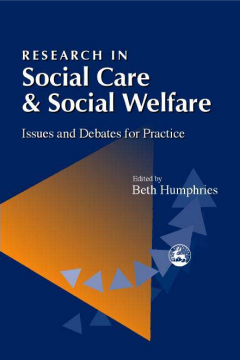
BOOK
Research in Social Care and Social Welfare
Phil Hodgkiss | Marion Martin | Beth Humphries | Adele Jones | Steve Morgan | Edward Mynott | Carol Packham | Mary Searle-Chatterjee | Paul Wilkins | David Boulton | Janet Batsleer | Tom Cockburn
(2000)
Additional Information
Book Details
Abstract
This important book explores the links between research, 'evidence-based' practice and policy in social care and social welfare. Basing their chapters in case-study material, the contributors examine the issues arising from qualitative and quantitative methodologies, critique orthodox views of ethics and language and offer examples of innovative social research methods.
Research in Social Work and Social Welfare highlights and questions the assumptions that underpin social research and examines the notions of power, ethics, language and representation in research. It questions, for example, the impact of research done by `the West' upon `the rest'. The book takes an international approach and promotes methods of research that are participative and `empowering' and seeks to widen the scope of methods used in social research. It will enable the reader to develop his or her own analytical and critical faculty and widen the scope of methods used in social research.
This volume will be an invaluable resource to students, researchers and practitioners using both quantitative and qualitative approaches.
The contributors to this volume are all engaged in social research of one kind or another, and their main aim is to scrutinise critically the ideas, assumptions and values which underlie present policies and practice in social welfare research. It is aimed at policy makers and practitioners but many advanced students of social welfare would find this book useful.
Aslib Book Guide
In her introduction, Beth Humphries discusses the Government's view of social research and the alarm within the research community that it could be assumed that academic research should be an instrument of "governance". Most of the contributors are lecturers and researcher from the Department of Applied Community Studies at Manchester Metropolitan University. Initially intended as a resource for colleagues and post-graduate research, the chapters range over models and methods of research, the assumptions on which research is based, the ethics of research and what can be judged as "legitimate" research". It was salutary to be reminded that the original meaning of audit is from the Latin "audire" to hear. As with so many jargon words, auditing is now viewed as a method of evaluation and accounting, rather than "hearing" people's opinions, needs or what resources are available. The writer stresses the need for such research to be anti-discriminatory and inclusive. Imaginative approaches are discussed, such as role play and drama, and there is a useful table of characteristics of research approaches, contrasting participation research/community auditing to non-participative methods. A valuable chapter for anyone interested in this area.
The volume concludes with Demystifying the Doctorate: Why do a PhD? - vital for any Rostrum reader contemplating such a venture! The passport is to academic status, not necessarily an academic post. Motivation is discussed in a stimulating and thought provoking way. If 2001 recalled a Space Odyssey, the challenge may lie in the last sentence: "Asking yourself why you want a Phd will help to evaluate whether studying for a doctorate is the most appropriate forum for you to pursue your intellectual work and the best way to achieve what is really important to you".
Rostrum
The reader will find in this text a rich array of challenges, argued with authority and very well illustrated... This is a very welcome addition to the plethora of research texts. It is written with authority, grounded in case examples, and offers a range of challenges to even the most seasoned researcher.
British Journal of Social Work
Table of Contents
| Section Title | Page | Action | Price |
|---|---|---|---|
| Research in Social Care and Social Welfare: Issues and Debates for Practice | 4 | ||
| Contents | 6 | ||
| 1. Perspectives on Social Research | 10 | ||
| 2. Collaborative Approaches to Research | 17 | ||
| 3. Exploring Young People’s Experience of Immigration Controls: The Search for an Appropriate Methodology | 32 | ||
| 4. Studying ‘Others’: Research and Representation | 49 | ||
| 5. Case Studying Organisations: The Use of Quantitative Approaches | 60 | ||
| 6. Disrupting Ethics in Social Research | 70 | ||
| 7. Unusual Terms: What Do You Mean By…? | 87 | ||
| 8. Casing the Joint: An Illegitimate Take on a Community of Care | 93 | ||
| 9. Community Auditing: Appropriate Research Methods for Effective Youth and Community Work Intervention | 103 | ||
| 10. Documentary and Text Analysis: Uncovering Meaning in a Worked Example | 120 | ||
| 11. Hidden from History: Research and Romantic Friendship | 133 | ||
| 12. Storytelling as Research | 145 | ||
| 13. Demystifying the Doctorate: Why Do a PhD? | 155 | ||
| The Contributors | 166 | ||
| Subject Index | 169 | ||
| Author Index | 175 |
